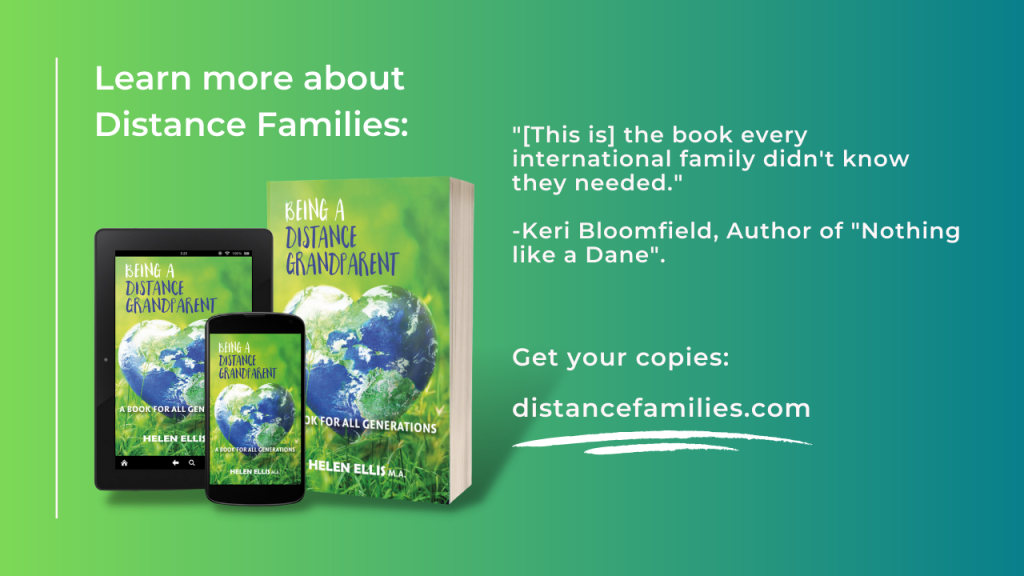Interview by Robyn Vogels with Helen Ellis, Distance Families
Robyn:
Helen thank you so much for sending me a preview of the book, I absolutely loved reading it.
Please talk about all three books you are working on and the three generations of your research. I know when I read your first edition there were a few things that resonated with me.
Helen:
Just to explain I am a distance grandparent and a distance parent and I’ve been that person for a long, long time. Three of our four children–I’ve got a blended marriage–live in England and two in America. Five of our six grandchildren are spread over those countries as well. I’m a step-parent, so I’ve been doing this for a long time.
When I realised that there was nothing out there to help the distance grandparents like me and I recognised that it was a lonely space for them. Well, I’ve done research at the university, I’ve done my Masters on the subject, so it was when I decided a book needed to be written because there was this huge void.
At first, I thought I would write about being a distance grandparent. But it wasn’t long before I realised that there are three parts to a distance family. In the generational story, there are the distance grandparents at home, there’s a distance between son and daughter that your adult children have decided to move somewhere for whatever reason and it’s their children.
We each experience this event in different ways and we all kind of think “Oh yeah. We know what it’s like for the other”. And in many respects we do. But there are some subtle things that we all don’t quite understand. So, from thinking I would write one book, I have now got the job to write three! I’ve done the first one: Being a Distance Grandparent and over the next year or so I’m going to complete writing Being a Distance Son or Daughter and then, Being a Distance Grandchild. And all the books have a subtitle of A book for all generations.
What it means, is that we all have to read all books! That way, we know exactly how it is for each person and I know that this is powerful because even for the likes of Robyn who’s a very experienced ex-pat–very familiar in the circles–she has learned things about how it is for her folks at home that she hadn’t thought about before. If we will understand each other better that generates empathy and empathy is good within distance families. So this is my humongous task. I’m an intergenerational empathy generator!
My goal is to help distance families understand each other better.
Robyn:
I think you are connecting the dots between the generations and across the globe!
With global families becoming such a bigger part of everybody’s lives, it is something we all just need to be aware of. As you say in the book, where you talk about the gatekeepers, the gate openers and the gate closers, it was eye-opening for me. Sometimes we don’t realise our role and the impact we have on others. When you have blended families and so many different dynamics it’s more important than ever to understand each person’s perspective. I’m the distant daughter. I’ve been away from our parents for 27 years now, and I didn’t think much about phoning home and saying “I’m pregnant”. I just did it! I didn’t think much about any sadness they might have felt.
It all comes down to clear communication and as you say empathetic communication is everything! Something else I found really interesting in your book was the fact that it’s always the older generation the grandparents that have to “make do”. It is always the grandparents that “take what they can get”, take holidays at a time when they can see grandchildren, for example. Visits revolve around that middle generation’s lifestyle. Grandparents, all too often, have to reorganise their plans to accommodate.
Helen:
Yes, that’s absolutely correct. The middle generation has to compete with work, nap times, meal times, so grandparents–near or far–must fit around the schedule. Of course, holidays are an issue– northern hemisphere/southern hemisphere situations, summer at different times. My American grandkids and my English grandkids can’t come and have an extended holiday in New Zealand in the summertime; they’ve only got two weeks off school! Full reunions with them altogether for Christmas or New Year is impossible!
We have family that have never met. In fact, my grandchildren in England who are 18 and 21 have never been to New Zealand.
Robyn:
Another point I found really interesting in your book is the topic of what connects people. I am asked so often, “What do you miss from South Africa?” I miss my family, of course, and I miss some foods. Food as a connector came through in your book. When families are together, it’s food that brings you together. Around the table, the BBQ, perhaps at a restaurant, food is such a connector of people but seems to be a connector of our roots and upbringing too. You spoke of senses, you talked about the smells, the noises, being a good listener at the same time it’s using all those senses of listening, smelling food, tasting, seeing things. It all connects us–the senses.
Helen:
That is true. You know the interviews were so real and brought to life by those senses. There were many tears along the way. I would have my proofreader send me a message saying “ I cried last night”. I would sit here, in this room and read a paragraph again and have to wipe my eyes. I know that person had opened up and was showing vulnerability.
Even now if I think about the fingerprints on my glass sliding doors that I didn’t clean for a while after my 15-month old left…you just leave those fingerprints there as a reminder. Or there is the stray sock under the couch cushion that didn’t quite get to the washing machine. The first thing you do is put it to your nose! You know, it means that distance grandparents don’t feel alone. I think the book also highlights that these grandparents are not alone; there are others in their neighbourhood.
Even if we consider what has happened in the last few days or weeks, in New Zealand and Australia we’ve opened travel bubbles and now we can fly back and forth. We’ve all watched the news and we’ve all watched these families at the airport and we’re very pleased for them; in fact, we’re delighted for them that they’re all connected but the rest of us sit here and wait. But, we must remember, we are not alone.
Helen's Relocation Top Tips
Robyn:
Well, I’m pleased that you’re opening people’s eyes to being that little bit more aware and of course EMPATHETIC to those around them.
I really wanted to chat with you about what people can do in advance before they leave.
Plant a seed early on
Helen:
I know your brain is full of all sorts of things, and it’s like you just don’t need something else. but just trust me whatever you do now is going to smooth things down the track.
I would suggest, even if you don’t know that you’re moving for sure but it’s kind of on the horizon, talk about it with your parents and grandparents. If you decide to tell them when it’s all organised and the decision is already made, they may never forgive you. This is a big shock for them.
Plant a seed plant a seed plant a seed. You are better to say “Hey, we’ve been thinking…it’s a big plan…we can’t be sure but this is what we’re thinking”. Allow them time to grieve, [have] time to think about it, time to look around at all their friends who are also distance grandparents and realising they’re going to join that club. It gives them much needed time, so I really recommend that. If you don’t move that’s fine, but if you do go they’ve had time to grieve.
Be on the same page
If you’re a couple you need to be on the same page with everything that’s happening. You’re going to be tested many, many, many times in which you don’t quite know yet–good ways, bad ways–so be on the same page.
Consider the time zone change
The change will affect you wherever you are potentially moving to and suggest to your parents and grandparents that you start some sort of routine in advance. I find it’s really common that we have what we call ”soft communication” routines. For example, Sunday nights or a time like that where you tend to catch up by video. Consider if your parents will always go to church on Sunday. Start thinking now and get the clock out to find what is the likely time of the day that you’re going to be calling them and start a routine, get everyone into a rhythm.
Delegate
It is not all your job to be the communicator. If your children are smart enough to connect with their friends via devices, they are smart enough to connect with their grandparents. Having ONE-ON-ONE time with their grandparents is vital. Set that expectation. Group calls are fine, but one-to-one is so important.
Robyn:
And I think as a parent, where you were talking in the book about gatekeepers, gate openers and gate closers, we have to be not only managing that but also giving the children the tools to be able to do this. Sometimes children don’t know what to say. As a parent, we can give them some cues and ideas. We are the ones who need to keep that gate open, as you say.
Helen:
Exactly and it works both ways; the grandparents will willingly take the advice. Tell them to buy a book of riddles or tell them to read up on the latest dinosaurs so they can talk about what a tyrannosaurus rex is or whatever. Tell your Grandparents what to do, and they will go and do the homework.
This will evolve. I remember having a conversation once with a distance daughter whose children were then talking with their cousins back home. She would overhear these conversations of absolute dribble and it concerned her that they were not having a sensible conversation. But she realised they would probably talk dribble if they were at home in-country, so let them just talk dribble. It doesn’t have to be profound just as it is.
There are so many games you can do now–scrabble, word searches, candy crush. You can join with family members and all those things. This obviously has to be age-appropriate, but there’s a lot that you could do.
Install needed tools
Some technical advice is for the distance son or daughter who’s leaving to install TeamViewer on their parent’s devices or computer. TeamViewer is a wonderful program. I use it myself and it means that your computer guru person can go to your computer online and fix something. I have a computer fix-it man who lives a 20-minute drive from my house and I can save a whole lot of driving time by giving him the password on a TeamViewer. He can go in, move around and fix something. So test it before you leave. Make sure grandparents understand how to get that password and email it. But it’s absolutely magic to have this person come and fix whatever needs to be.
Grandparents want the communication there, so they’re going to be open to anything. Teenage awkwardness–that’s a great job for them to do with the grandparents before they leave. As long as you tell [the grandkids] to be patient and don’t be surprised if they get asked the same thing a few times. Write it down. I’ve got post-it notes on my monitor as well. A wonderful way to bond. I really miss my IT department children who are around the world. I wish they were here sometimes.
Why You Should Read Helen's Book
Robyn:
That’s what your book does; it makes people aware of those things and just how the other might be thinking. It’s always important for the grandparents to have some sort of idea of when they will see you again. If the son or daughter is in the position that the company flies them back to the home country every year, make sure you tell the grandparents “We’re going to be settling in, but we can come back every year.” Those things seem obvious to us, but the grandparents just need that reassurance even if it’s something obvious.
Helen:
There are a number of great resources and ideas on my website, so do take a look!
Robyn:
Helen Ellis, it has been an absolute pleasure getting to know you, read your book and understand your research. Please let us know where we can find your book and follow your research:
Helen:
They’ll be in bookshops and also my website under Shop there. I’ve put the best online site to go to in New Zealand specifically because I think the grandparents would like to own a copy but maybe the distance son or daughter wants to give a copy to them. So do go to the shop page of my website because I where I can find a country-specific online source. I’ve listed it just to save a whole lot of pain.







